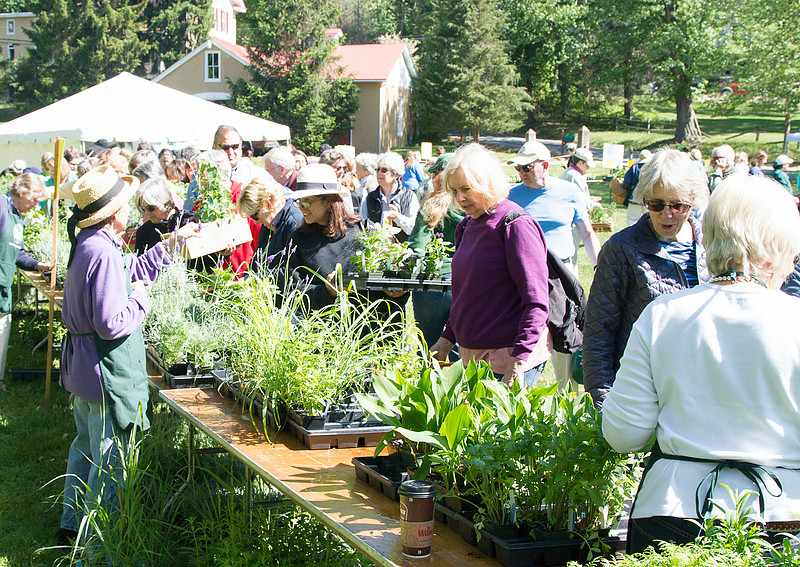Herb Ladies
May 12, 2016
THERE is a certain type of older woman. She is not very noticeable in a crowd and typically has not done anything much of worldly importance, but she is someone whom I’ve always admired. She usually has gray hair (rarely dyed hair) and something about her matronly face that is distinctive. There’s a visible peace about her — a peace and nobility that is rare in this frazzled world. She is an aristocrat of the earth. After many years of working in the garden, she has acquired a knowledgeable intimacy with plants and a confident dominion over them that together suggest an overall wisdom about life, as if she herself is rooted in place. But then who could be lost or alienated with so many friends — friends who disappear in the winter (except for the few brought inside) and then always, without fail, return in the spring. There is never a spring without them, never a May in which they cannot be counted on to assert their remarkable individuality and mute tenderness. Everything else may change. Other friends die and never return. Other friends move away. But these always return, often different plants, it’s true, but always the same nevertheless. Their loyalty is positively shocking.
This reliability and this treasury of botanical personality must be the source of at least some of the herb lady’s essential stability. Or perhaps her essential stability makes her appreciate herbs. And then she has had the leisure to cultivate an interest in herbs, and leisure, which isn’t simply free time, is inherently civilizing. The difference between a lady and a woman is that a lady has had leisure. It’s hard to imagine her whining. She is not easily bored. The earth and her connection with its rhythms seem to have softened in her the perennial human tendency toward dissatisfaction.
I attend an herb sale every year in which the volunteers are almost all herb ladies (there are a few men too.) Women, more than men, appreciate the scents and visual charms of herbs and women traditionally use them more because they tend to do the everyday cooking. The herb ladies work for months, without pay of course, growing the basil and marjoram and thyme, and many others, from seeds in cold greenhouses. They then label them and pack them up. Buyers line up at the gate an hour before with baskets and boxes. Tension and greed hang in the air, as the waiting customers, rain or shine, look avidly at the plants (especially the salvias) piled up on tables behind a fence in a green field. It’s as if spring itself is captive behind the fence, an exquisite, domesticated creature corralled in a field and momentarily unattainable.
I know a bank where the wild thyme blows,
Where oslips and the nodding violet grows.
Quite over-canopied with luscious woodbine
With sweet musk-roses with eglantine
There sleeps Titania sometime of the night
Lull’d in these flowers with dances and delight. (A Midsummer’s Night’s Dream)
I can’t quite explain those moments, the happiness and anxiety combined. Everyone is secretly thinking, “It’s more crowded this year than ever.” And everyone is also thinking, “This is one of the best days of my life.”
Once the entrance is open, the competitive crowd surges forward in a contained frenzy. Some are almost running. Some are pretending to walk. You can’t get close enough to the salvias which rise up in a blanket of nodding pinks and reds, deep purples and royal blues above the reaching arms and sea of heads. “Which are your favorite?” someone calls out to the herb lady at the table. The crowd hangs on her reply. Whatever her answer is, it vanishes right away because she exudes expertise. This year the “Hot Lips” were gone in seconds.
At the scented geranium table, behind the Pelargonium tomentosum, with its velvety leaves and peppermint scent; the Pelargonium “Fair Ellen,” with dark pink flowers and purple veins; and Pelargonium “Cinnamon Rose,” its pungent leaves as if crinkled in the hand, behind this green wall of delicate spiciness — there she is, a garden sage, usually older than the rest, as geraniums seem to be particularly attractive in advanced age, dispensing a phrase or two that sums up the qualities of each. This is bad, in a way, because she never says anything negative, does she? That means you want more, more, more.
There is another sage at the sage table, where there are seven different kinds that she knows well, including the big-leaved variety that supposedly tastes superior to the rest. You would think parsley would be a boring plant, but even there something unusual is available, a huge, curly-leafed specimen that tastes like celery. If she likes it, it must be good. Another explains the lavenders. Another talks about a Thai dish with lemongrass.
Though herb ladies have lost some of their patrician edge in recent years as they’ve taken to wearing baseball caps and jeans, their femininity has not disappeared. There are no herb ladies with tattoos or piercings. I don’t think there ever will be.
There are little old ladies, fragile as tea cups, waiting to tally the purchases at folding tables, not quite good at math, too old to be lifting boxes of plants, but exuding that unmistakable peace.
There comes a time when the herb lady can no longer dig. She may have to leave the garden altogether. But that doesn’t stop her friends. Her garden has changed her. Only for the better. Out there somewhere, beyond the window of her place of quarantine, they rise up from the dark, seemingly inhospitable ground each spring. True friend, her confidence, her erudition and her fascination with them remain to the end. There is a song, a green and enchanted song, for which there can never be enough applause.


